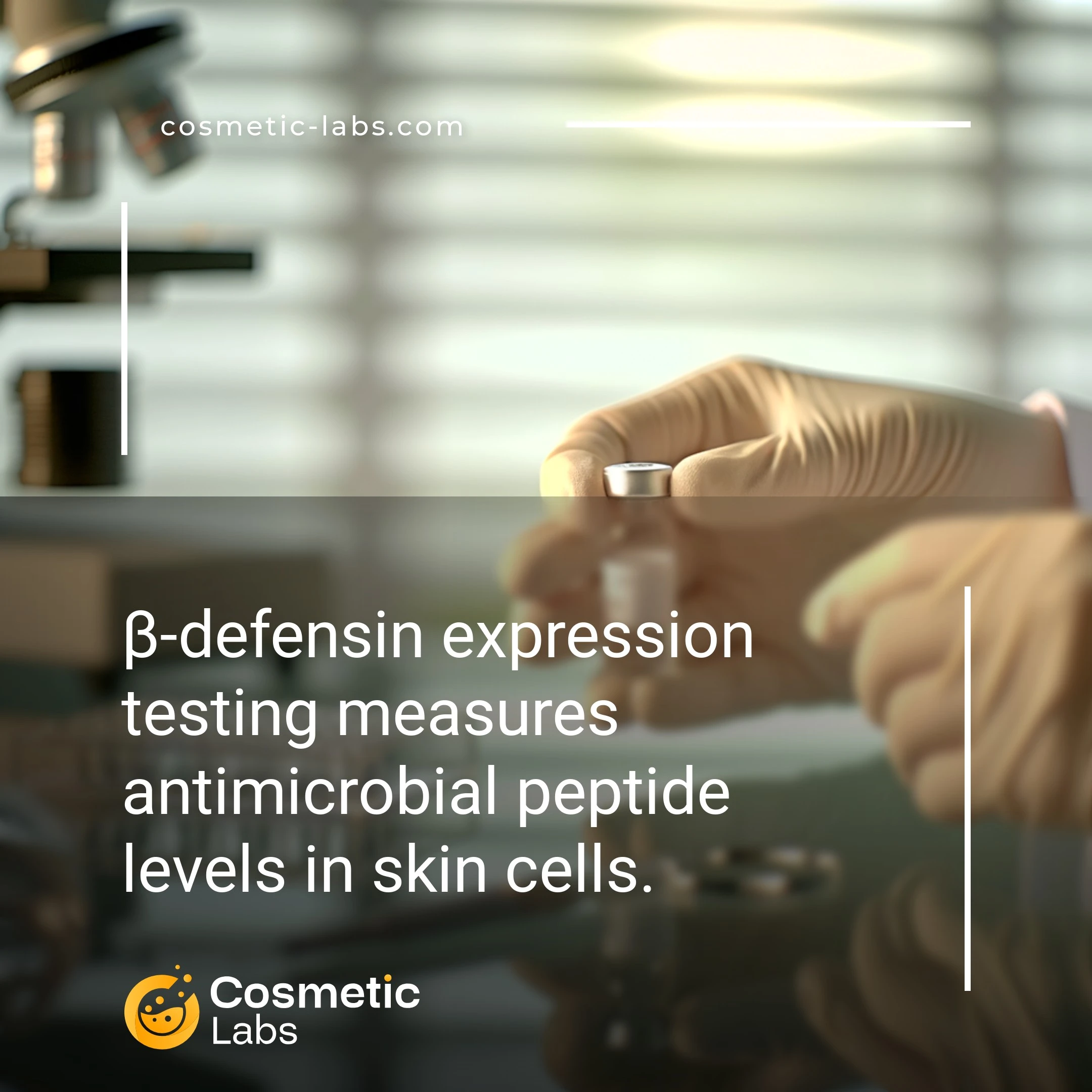β-Defensin Expression Testing for Skin Immunity Claims

What is β-defensin expression?
β-defensin expression testing for skin immunity measures how cosmetic ingredients stimulate the production of antimicrobial peptides in skin cells, providing quantifiable data on your product’s ability to enhance natural barrier defense. Labs use keratinocyte cell cultures exposed to test formulations, then analyze defensin gene expression through qPCR analysis within 24-48 hours. This biomarker assessment reveals whether your active ingredients actually boost skin’s innate immune response—a claim increasingly valued by consumers seeking science-backed skincare solutions.
Why do you need this service?
Cosmetic labs use β-defensin expression testing to validate antimicrobial claims for skincare products targeting acne, sensitive skin, and barrier repair formulations. This preclinical assay measures how active ingredients boost the skin’s natural defense peptides, providing quantifiable data for regulatory submissions and marketing claims about enhanced skin immunity and protection against environmental stressors.
Who provides β-defensin expression services?
All cosmetic labs providing β-defensin expression services
There is no company providing these services at the moment.
β-Defensin Expression Testing for Skin Immunity Validation
β-defensin expression testing measures how cosmetic ingredients and formulations influence the skin’s natural antimicrobial peptide production. This preclinical assessment helps brands validate immunity-boosting claims by quantifying defensin levels in skin cell cultures treated with test products.
Antimicrobial Peptide Analysis Methods
Labs use keratinocyte cell cultures to measure β-defensin-2 and β-defensin-3 expression after ingredient exposure. Standard protocols include RT-PCR analysis and ELISA quantification to track peptide production changes. Testing typically runs 24-72 hours with multiple concentration points.
- Gene expression analysis via qRT-PCR
- Protein quantification through immunoassays
- Dose-response curve generation
- Statistical significance testing
Results show whether ingredients stimulate the skin’s natural defense mechanisms, supporting immunity-related marketing claims.
Skin Barrier Defense Validation
Testing services evaluate how formulations affect the skin’s innate immune response under controlled conditions. Labs expose reconstructed skin models to potential irritants while measuring defensin upregulation in response to treatment products. This approach simulates real-world skin challenges.
Data includes fold-change measurements, time-course analysis, and comparison against positive controls. Brand owners receive detailed reports showing peptide expression patterns and statistical analysis for regulatory submissions.
Connect with specialized labs on our platform to discuss β-defensin testing protocols tailored to your product development needs.
Practical Applications of β-Defensin Expression Testing for Skin Immunity
β-defensin expression testing for skin immunity enables cosmetic brands to validate antimicrobial claims and optimize formulations with measurable data on natural defense mechanisms.
Anti-Acne Product Development and Validation
Labs measure β-defensin-2 and β-defensin-3 expression levels in keratinocytes treated with active ingredients like niacinamide, zinc compounds, or botanical extracts. This testing protocol takes 72-96 hours and provides quantitative data on antimicrobial peptide upregulation. Brands use these results to support acne-fighting claims and optimize ingredient concentrations.
The assay involves RT-qPCR analysis of defensin gene expression, with results showing 2-5 fold increases in expression for effective formulations. This data directly supports regulatory submissions and marketing claims about enhanced skin defense mechanisms.
Sensitive Skin Formulation Optimization
Testing services evaluate how ingredients affect β-defensin expression in compromised skin barrier models. Labs expose cultured skin cells to potential irritants alongside protective ingredients, measuring defensin response patterns over 24-48 hours. This approach identifies formulations that maintain or boost natural antimicrobial defenses without triggering inflammation.
Results guide ingredient selection for sensitive skin products, with successful formulations showing maintained β-defensin-1 expression levels. Brands achieve validated gentle-yet-effective positioning through this targeted testing approach.
| Defensin Type | Primary Function | Testing Timeline | Key Applications |
|---|---|---|---|
| β-defensin-1 | Baseline antimicrobial protection | 24-48 hours | Sensitive skin formulations |
| β-defensin-2 | Inflammatory response defense | 48-72 hours | Anti-acne treatments |
| β-defensin-3 | Broad-spectrum antimicrobial | 72-96 hours | Barrier repair products |
Ready to validate your formulation’s impact on skin immunity? Contact specialized labs on our platform to discuss β-defensin expression testing protocols tailored to your product development needs.
